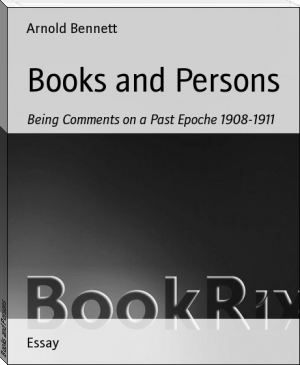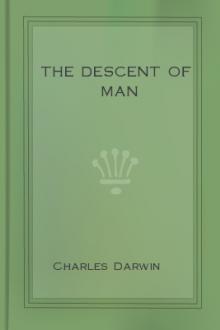Books and Persons - Arnold Bennett (phonics readers .TXT) 📗

- Author: Arnold Bennett
Book online «Books and Persons - Arnold Bennett (phonics readers .TXT) 📗». Author Arnold Bennett
richly atoned for his unconscious farcicalness by a multitude of single lines that, in their pregnant sublimity, attend the Wordsworthian like a shadow throughout his life, warning him continually when he is in danger of making a fool of himself. Thus, whenever through mere idleness I begin to waste the irrecoverable moments of eternity, I always think of that masterly phrase (from, I think, the "Prelude," but I will not be sure):
_Unprofitably travelling towards the grave._
This line is a most convenient and effective stone to throw at one's languid friends. Finally let me hail Mr. Nowell Smith as a benefactor.
NOVELISTS AND AGENTS
[_20 June '08_]
A bad publishing season is now drawing to a close, and in the air are rumours of a crisis. Of course the fault is the author's. It goes without saying that the fault is the author's. In the first place, he will insist on producing mediocre novels. (For naturally the author is a novelist; only novelists count when crises loom. Algernon Charles Swinburne, Edward Carpenter, Robert Bridges, Lord Morley--these types have no relation to crises.) It appears that the publishers have been losing money over the six-shilling novel, and that they are not going to stand the loss any longer. It is stated that never in history were novels so atrociously mediocre as they are to-day. And in the second place, the author will insist on employing an Unspeakable Rascal entitled a literary agent, and the poor innocent lamb of a publisher is fleeced to the naked skin by this scoundrel every time the two meet. Already I have heard that one publisher, hitherto accustomed to the services of twenty gardeners at his country house, has been obliged to reduce the horticultural staff to eighteen.
Such is the publishers' explanation of the crisis. I shall keep my own explanation till the crisis is a little more advanced and ready to burst. In the meantime I should like to ask: How _do_ people manage to range over the whole period of the novel's history and definitely decide that novels were never so bad as they are now? I am personally inclined to think that at no time has the average novel been so good as it is to-day. (This view, by the way, is borne out by publishers' own advertisements, which abound in the word "masterpiece" quoted from infallible critics of great masterpieces!) Let any man who disagrees with me dare go to Mudie's and get out a few forgotten novels of thirty years ago and try to read them! Also, I am prepared to offer L50 for the name and address of a literary agent who is capable of getting the better of a publisher. I am widely acquainted with publishers and literary agents, and though I have often met publishers who have got the better of literary agents, I have never met a literary agent who has come out on top of a publisher. Such a literary agent is badly wanted. I have been looking for him for years. I know a number of authors who would join me in enriching that literary agent. The publishers are always talking about him. I seldom go into a publisher's office but that literary agent has just left (gorged with illicit gold). It irritates me that I cannot run across him. If I were a publisher, he would have been in prison ere now. Briefly, the manner in which certain prominent publishers, even clever ones, talk about literary agents is silly.
* * * * *
Still, I am ready to believe that publishers have lost money over the six-shilling novel. I am acquainted with the details of several instances of such loss. And in every case the loss has been the result of gambling on the part of the publisher. I do not hesitate to say that the terms offered in late years by some publishers to some popular favourites have been grotesquely inflated. Publishers compete among themselves, and then, when the moment comes for paying the gambler's penalty, they complain of having been swindled. Note that the losses of publishers are nearly always on the works of the idols of the crowd. They want the idol's name as an ornament to their lists, and they commit indiscretions in order to get it. Fantastic terms are never offered to the solid, regular, industrious, medium novelist. And it is a surety that fantastic terms are never offered to the beginner. Ask, and learn.
* * * * *
But though I admit that money has been lost, I do not think the losses have been heavy. After all, no idolized author and no diabolic agent can force a publisher to pay more than he really wants to pay. And no diabolic agent, having once bitten a publisher, can persuade that publisher to hold out his generous hand to be bitten again. These are truisms. Lastly, I am quite sure that, out of books, a great deal more money has been made by publishers than by authors, and that this will always be so. The threatened crisis in publishing has nothing to do with the prices paid to authors, which on the whole are now fairly just (very different from what they were twenty years ago, when authors had to accept whatever was condescendingly offered to them). And if a crisis does come, the people to suffer will happily be those who can best afford to suffer.
THE NOVEL OF THE SEASON
[_11 July '08_]
The publishing season--the bad publishing season--is now practically over, and publishers may go away for their holidays comforted by the fact that they will not begin to lose money again till the autumn. It only remains to be decided which is the novel of the season. Those interested in the question may expect it to be decided at any moment, either in the _British Weekly_ or the _Sphere_. I take up these journals with a thrill of anticipation. For my part, I am determined only to decide which is not the novel of the season. There are several novels which are not the novel of the season. Perhaps the chief of them is Mr. E.C. Booth's "The Cliff End," which counts among sundry successes to the score of Mr. Grant Richards. Everything has been done for it that reviewing can do, and it has sold, and it is an ingenious and giggling work, but not the novel of the season.
The reviews of "The Cliff End," almost unanimously laudatory, show in a bright light our national indifference to composition in art. Some reviewers, while stating that the story itself was a poor one, insisted that Mr. Booth is a born and accomplished story-teller. Story-tellers born and accomplished do not tell poor stories. A poor story is the work of a poor story-teller. And the story of "The Cliff End" is merely absurd. It is worse, if possible, than the story of Mr. Maxwell's "Vivien," which reviewers accepted. It would appear that with certain novels the story doesn't matter! I really believe that composition, the foundation of all arts, including the art of fiction, is utterly unconsidered in England. Or if it is considered, it is painfully misunderstood. I remember how the panjandrums condescendingly pointed out the bad construction of Mr. Joseph Conrad's "Lord Jim," one of the most noble examples of fine composition in modern literature, and but slightly disfigured by a detail of clumsy machinery. In "The Cliff End" there is simply no composition that is not clumsy and conventional. All that can be said of it is that you can't read a page, up to about page 200, without grinning. (Unhappily Mr. Booth overestimated his stock of grins, which ran out untimely.) The true art of fiction, however, is not chiefly connected with grinning, or with weeping. It consists, first and mainly, in a beautiful general composition. But in Anglo-Saxon countries any writer who can induce both a grin and a tear on the same page, no matter how insolent his contempt for composition, is sure of that immortality which contemporaries can award.
* * * * *
Another novel that is not the novel of the season is Mr. John Ayscough's "Marotz," about which much has been said. I do not wish to labour this point. "Marotz" is not the novel of the season. I trust that I make myself plain. I shall not pronounce upon Mr. Masefield's "Captain Margaret," because, though it has been splashed all over by trowelfuls of slabby and mortarish praise, it has real merits. Indeed, it has a chance of being the novel of the season. Mr. Masefield is not yet grown up. He is always trying to write "literature," and that is a great mistake. He should study the wisdom of Paul Verlaine:
_Prends l'eloquence et tords-lui son cou._
Take literature and wring its neck. I suppose that Mr. H. de Vere Stacpoole's "The Blue Lagoon" is not likely to be selected as the novel of the season. And yet, possibly, it will be the novel of the season after all, though unchosen. I will not labour this point, either. Any one read "The Blue Lagoon" yet? Some folk have read it, for it is in its sixth edition. But when I say any one, I mean some one, not mere folk. It might be worth looking into, "The Blue Lagoon." _Verbum sap._, often, to Messrs. Robertson Nicoll and Shorter. In choosing "Confessio Medici" as the book of the season in general literature, Dr. Nicoll [Now Sir William Robertson Nicoll] has already come a fearful cropper, and he must regret it. I would give much to prevent him from afflicting the intelligent when the solemn annual moment arrives for him to make the reputation of a novelist.
GERMAN EXPANSION
[_18 July '08_]
I think I could read anything about German Colonial expansion. The subject may not appear to be attractive; but it is. The reason lies in the fact that one is always maliciously interested in the failures of pompous and conceited persons. In the same way, one is conscious of disappointment that the navy pother has not blossomed into a naked scandal. A naked scandal would be a bad thing, and yet one feels cheated because it has not occurred. At least I do. And I am rather human. I can glut myself on German colonial expansion--a wondrous flower. I have just read with genuine avidity M. Tonnelat's "L'Expansion allemande hors d'Europe" (Armand Colin, 3 fr. 50). It is a very good book. Most of it does not deal with colonial expansion, but with the growth and organization of Germania in the United States and Brazil. There is some delicious psychology in this part of the book. Hear the German Governor of Pennsylvania: "As for me, I consider that if the influence of the German colonist had been eliminated from Pennsylvania, Philadelphia would never have been anything but an ordinary American town like Boston, New York, Baltimore, or Chicago." M. Tonnelat gives a masterly and succinct account of the relations between Germans and native races in Africa (particularly the Hereros). It is farcical, disastrous, piquant, and grotesque. The documentation is admirably done.
_Unprofitably travelling towards the grave._
This line is a most convenient and effective stone to throw at one's languid friends. Finally let me hail Mr. Nowell Smith as a benefactor.
NOVELISTS AND AGENTS
[_20 June '08_]
A bad publishing season is now drawing to a close, and in the air are rumours of a crisis. Of course the fault is the author's. It goes without saying that the fault is the author's. In the first place, he will insist on producing mediocre novels. (For naturally the author is a novelist; only novelists count when crises loom. Algernon Charles Swinburne, Edward Carpenter, Robert Bridges, Lord Morley--these types have no relation to crises.) It appears that the publishers have been losing money over the six-shilling novel, and that they are not going to stand the loss any longer. It is stated that never in history were novels so atrociously mediocre as they are to-day. And in the second place, the author will insist on employing an Unspeakable Rascal entitled a literary agent, and the poor innocent lamb of a publisher is fleeced to the naked skin by this scoundrel every time the two meet. Already I have heard that one publisher, hitherto accustomed to the services of twenty gardeners at his country house, has been obliged to reduce the horticultural staff to eighteen.
Such is the publishers' explanation of the crisis. I shall keep my own explanation till the crisis is a little more advanced and ready to burst. In the meantime I should like to ask: How _do_ people manage to range over the whole period of the novel's history and definitely decide that novels were never so bad as they are now? I am personally inclined to think that at no time has the average novel been so good as it is to-day. (This view, by the way, is borne out by publishers' own advertisements, which abound in the word "masterpiece" quoted from infallible critics of great masterpieces!) Let any man who disagrees with me dare go to Mudie's and get out a few forgotten novels of thirty years ago and try to read them! Also, I am prepared to offer L50 for the name and address of a literary agent who is capable of getting the better of a publisher. I am widely acquainted with publishers and literary agents, and though I have often met publishers who have got the better of literary agents, I have never met a literary agent who has come out on top of a publisher. Such a literary agent is badly wanted. I have been looking for him for years. I know a number of authors who would join me in enriching that literary agent. The publishers are always talking about him. I seldom go into a publisher's office but that literary agent has just left (gorged with illicit gold). It irritates me that I cannot run across him. If I were a publisher, he would have been in prison ere now. Briefly, the manner in which certain prominent publishers, even clever ones, talk about literary agents is silly.
* * * * *
Still, I am ready to believe that publishers have lost money over the six-shilling novel. I am acquainted with the details of several instances of such loss. And in every case the loss has been the result of gambling on the part of the publisher. I do not hesitate to say that the terms offered in late years by some publishers to some popular favourites have been grotesquely inflated. Publishers compete among themselves, and then, when the moment comes for paying the gambler's penalty, they complain of having been swindled. Note that the losses of publishers are nearly always on the works of the idols of the crowd. They want the idol's name as an ornament to their lists, and they commit indiscretions in order to get it. Fantastic terms are never offered to the solid, regular, industrious, medium novelist. And it is a surety that fantastic terms are never offered to the beginner. Ask, and learn.
* * * * *
But though I admit that money has been lost, I do not think the losses have been heavy. After all, no idolized author and no diabolic agent can force a publisher to pay more than he really wants to pay. And no diabolic agent, having once bitten a publisher, can persuade that publisher to hold out his generous hand to be bitten again. These are truisms. Lastly, I am quite sure that, out of books, a great deal more money has been made by publishers than by authors, and that this will always be so. The threatened crisis in publishing has nothing to do with the prices paid to authors, which on the whole are now fairly just (very different from what they were twenty years ago, when authors had to accept whatever was condescendingly offered to them). And if a crisis does come, the people to suffer will happily be those who can best afford to suffer.
THE NOVEL OF THE SEASON
[_11 July '08_]
The publishing season--the bad publishing season--is now practically over, and publishers may go away for their holidays comforted by the fact that they will not begin to lose money again till the autumn. It only remains to be decided which is the novel of the season. Those interested in the question may expect it to be decided at any moment, either in the _British Weekly_ or the _Sphere_. I take up these journals with a thrill of anticipation. For my part, I am determined only to decide which is not the novel of the season. There are several novels which are not the novel of the season. Perhaps the chief of them is Mr. E.C. Booth's "The Cliff End," which counts among sundry successes to the score of Mr. Grant Richards. Everything has been done for it that reviewing can do, and it has sold, and it is an ingenious and giggling work, but not the novel of the season.
The reviews of "The Cliff End," almost unanimously laudatory, show in a bright light our national indifference to composition in art. Some reviewers, while stating that the story itself was a poor one, insisted that Mr. Booth is a born and accomplished story-teller. Story-tellers born and accomplished do not tell poor stories. A poor story is the work of a poor story-teller. And the story of "The Cliff End" is merely absurd. It is worse, if possible, than the story of Mr. Maxwell's "Vivien," which reviewers accepted. It would appear that with certain novels the story doesn't matter! I really believe that composition, the foundation of all arts, including the art of fiction, is utterly unconsidered in England. Or if it is considered, it is painfully misunderstood. I remember how the panjandrums condescendingly pointed out the bad construction of Mr. Joseph Conrad's "Lord Jim," one of the most noble examples of fine composition in modern literature, and but slightly disfigured by a detail of clumsy machinery. In "The Cliff End" there is simply no composition that is not clumsy and conventional. All that can be said of it is that you can't read a page, up to about page 200, without grinning. (Unhappily Mr. Booth overestimated his stock of grins, which ran out untimely.) The true art of fiction, however, is not chiefly connected with grinning, or with weeping. It consists, first and mainly, in a beautiful general composition. But in Anglo-Saxon countries any writer who can induce both a grin and a tear on the same page, no matter how insolent his contempt for composition, is sure of that immortality which contemporaries can award.
* * * * *
Another novel that is not the novel of the season is Mr. John Ayscough's "Marotz," about which much has been said. I do not wish to labour this point. "Marotz" is not the novel of the season. I trust that I make myself plain. I shall not pronounce upon Mr. Masefield's "Captain Margaret," because, though it has been splashed all over by trowelfuls of slabby and mortarish praise, it has real merits. Indeed, it has a chance of being the novel of the season. Mr. Masefield is not yet grown up. He is always trying to write "literature," and that is a great mistake. He should study the wisdom of Paul Verlaine:
_Prends l'eloquence et tords-lui son cou._
Take literature and wring its neck. I suppose that Mr. H. de Vere Stacpoole's "The Blue Lagoon" is not likely to be selected as the novel of the season. And yet, possibly, it will be the novel of the season after all, though unchosen. I will not labour this point, either. Any one read "The Blue Lagoon" yet? Some folk have read it, for it is in its sixth edition. But when I say any one, I mean some one, not mere folk. It might be worth looking into, "The Blue Lagoon." _Verbum sap._, often, to Messrs. Robertson Nicoll and Shorter. In choosing "Confessio Medici" as the book of the season in general literature, Dr. Nicoll [Now Sir William Robertson Nicoll] has already come a fearful cropper, and he must regret it. I would give much to prevent him from afflicting the intelligent when the solemn annual moment arrives for him to make the reputation of a novelist.
GERMAN EXPANSION
[_18 July '08_]
I think I could read anything about German Colonial expansion. The subject may not appear to be attractive; but it is. The reason lies in the fact that one is always maliciously interested in the failures of pompous and conceited persons. In the same way, one is conscious of disappointment that the navy pother has not blossomed into a naked scandal. A naked scandal would be a bad thing, and yet one feels cheated because it has not occurred. At least I do. And I am rather human. I can glut myself on German colonial expansion--a wondrous flower. I have just read with genuine avidity M. Tonnelat's "L'Expansion allemande hors d'Europe" (Armand Colin, 3 fr. 50). It is a very good book. Most of it does not deal with colonial expansion, but with the growth and organization of Germania in the United States and Brazil. There is some delicious psychology in this part of the book. Hear the German Governor of Pennsylvania: "As for me, I consider that if the influence of the German colonist had been eliminated from Pennsylvania, Philadelphia would never have been anything but an ordinary American town like Boston, New York, Baltimore, or Chicago." M. Tonnelat gives a masterly and succinct account of the relations between Germans and native races in Africa (particularly the Hereros). It is farcical, disastrous, piquant, and grotesque. The documentation is admirably done.
Free e-book «Books and Persons - Arnold Bennett (phonics readers .TXT) 📗» - read online now
Similar e-books:





Comments (0)